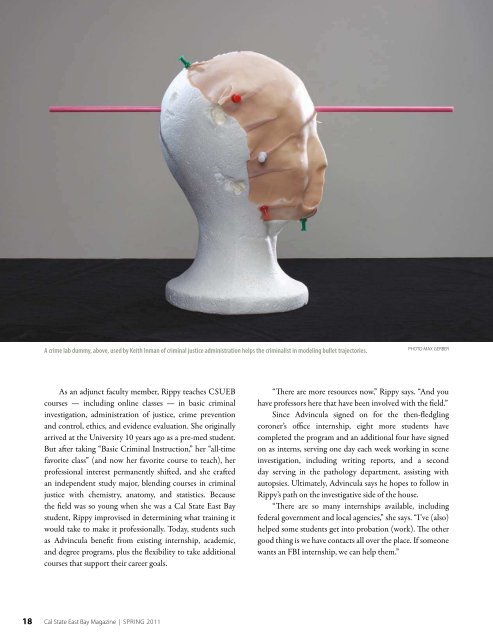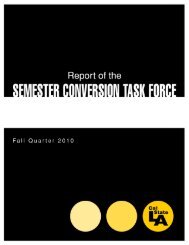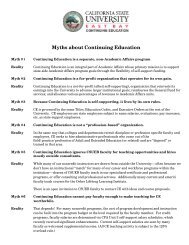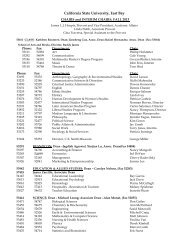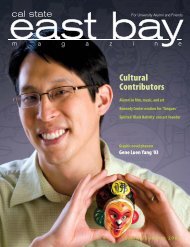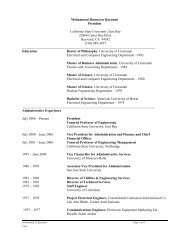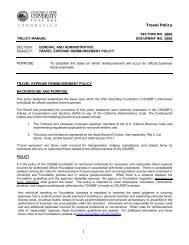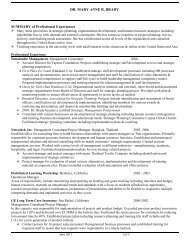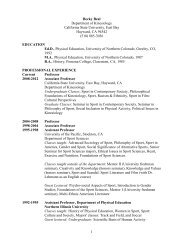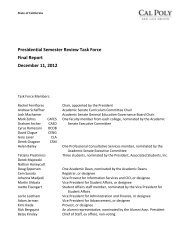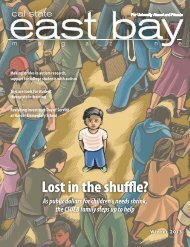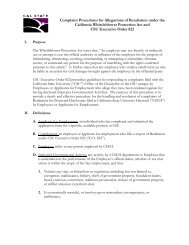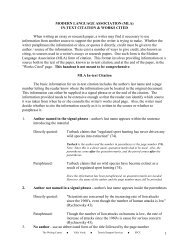Beyond CSI - California State University, East Bay
Beyond CSI - California State University, East Bay
Beyond CSI - California State University, East Bay
You also want an ePaper? Increase the reach of your titles
YUMPU automatically turns print PDFs into web optimized ePapers that Google loves.
features<br />
A crime lab dummy, above, used by Keith Inman of criminal justice administration helps the criminalist in modeling bullet trajectories.<br />
As an adjunct faculty member, Rippy teaches CSUEB<br />
courses — including online classes — in basic criminal<br />
investigation, administration of justice, crime prevention<br />
and control, ethics, and evidence evaluation. She originally<br />
arrived at the <strong>University</strong> 10 years ago as a pre-med student.<br />
But after taking “Basic Criminal Instruction,” her “all-time<br />
favorite class” (and now her favorite course to teach), her<br />
professional interest permanently shifted, and she crafted<br />
an independent study major, blending courses in criminal<br />
justice with chemistry, anatomy, and statistics. Because<br />
the field was so young when she was a Cal <strong>State</strong> <strong>East</strong> <strong>Bay</strong><br />
student, Rippy improvised in determining what training it<br />
would take to make it professionally. Today, students such<br />
as Advincula benefit from existing internship, academic,<br />
and degree programs, plus the flexibility to take additional<br />
courses that support their career goals.<br />
PHOTO MAX GERBER<br />
“There are more resources now,” Rippy says. “And you<br />
have professors here that have been involved with the field.”<br />
Since Advincula signed on for the then-fledgling<br />
coroner’s office internship, eight more students have<br />
completed the program and an additional four have signed<br />
on as interns, serving one day each week working in scene<br />
investigation, including writing reports, and a second<br />
day serving in the pathology department, assisting with<br />
autopsies. Ultimately, Advincula says he hopes to follow in<br />
Rippy’s path on the investigative side of the house.<br />
“There are so many internships available, including<br />
federal government and local agencies,” she says. “I’ve (also)<br />
helped some students get into probation (work). The other<br />
good thing is we have contacts all over the place. If someone<br />
wants an FBI internship, we can help them.”<br />
NO SCIENTIFIC SHORTCUTS<br />
Wearing blue scrubs and black clogs, Advincula spends<br />
one recent afternoon at his new job reviewing the day’s three<br />
cases, filling out case paperwork, and awaiting the pickup of<br />
the deceased. Any glamorous allure the job once held long<br />
ago was replaced by the daily medical realities of preparing<br />
tissue samples, examining muscles for signs of disease, and<br />
resolving himself to the passing of people from newlyweds<br />
to grandmothers.<br />
During one autopsy, Advincula stared into the face of a<br />
young man who he says “could have been me” — same age,<br />
same Filipino heritage, and only a few months out of college<br />
when he died.<br />
“That’s part of why I love this job,” he says. “A lot of<br />
people take things for granted, especially their lives.”<br />
“I appreciate life so much more now.”<br />
By graduation, CSUEB students like Advincula, who<br />
have enrolled in courses from across the <strong>University</strong> catalog,<br />
emerge with a realistic sense of what to expect on the job. It’s<br />
the kind of job-readiness that area employers often say gives<br />
CSUEB grads an edge in the employment market.<br />
As Inman puts it: “They know by the time they’ve been<br />
through two or three of my classes that it’s not a (profession<br />
where you) jump out of bed, put on your designer clothes,<br />
hop in the Hummer, and helicopter into the crime scene.”<br />
<strong>CSI</strong>-type TV shows are all about “getting the suspect”<br />
in 60 minutes, often using imaginary technology that<br />
spits out foolproof DNA or fingerprint matches instantly,<br />
Advincula explains. His job as a forensic autopsy technician,<br />
on the other hand, focuses on determining why someone<br />
died based on what their body reveals; no scientific shortcuts<br />
available. Instead, the methodical work requires patience,<br />
thoroughness, and objectivity. Analyzing deaths due to<br />
causes from gang shootings to self-inflicted wounds, he says,<br />
has taught him to keep an open mind.<br />
“You really have to question a lot of things,” Advincula<br />
says. “You can’t take everything at face value.” n<br />
Get connected<br />
Read about former classmates’ successes,<br />
check out job leads, and learn about<br />
upcoming speakers at the new Facebook<br />
page for Cal <strong>State</strong> <strong>East</strong> <strong>Bay</strong> Criminal Justice<br />
Alumni. Launched in January, the social media<br />
page also features faculty photos and alerts<br />
about professional conferences and invites<br />
departmental alumni to share their news.<br />
Regional<br />
businesses tap<br />
<strong>University</strong> for<br />
cybersecurity<br />
training<br />
By Nancy Garcia<br />
It takes more than locks and alarms to protect electronic assets. As<br />
banking, government systems, and socializing depend more on online<br />
networks, increasingly sophisticated crooks are tempted to steal or<br />
damage information involving anything from the nation’s defenses and<br />
power grid to commerce and personal identity.<br />
Due to continually evolving threats to exploit or cripple computer systems,<br />
mobile communications, and data networks, cybersecurity is going to be<br />
a growing field, says Criminal Justice Administration Department Chair<br />
Silvina Ituarte.<br />
Increasingly, corporations are turning to universities, including Cal <strong>State</strong><br />
<strong>East</strong> <strong>Bay</strong>, for help training workers.<br />
Levent Ertaul, an associate professor in the Department of Mathematics and<br />
Computer Sciences, is collaborating with the <strong>Bay</strong> Area Council – a public<br />
policy group comprised of area business leaders – to design a certificate<br />
program in information assurance that would train business managers to<br />
boost their companies’ information security while minimizing vulnerability.<br />
The curriculum will provide insight into how operational decisions can<br />
affect protecting employees’ privacy, shielding the company’s data, and<br />
averting attempted cyber attacks.<br />
Ertaul believes everyone should be mindful of risks. When he attends<br />
meetings with faculty from Carnegie Mellon and other universities, he says,<br />
the whole group talks about K-12 education.<br />
“We have to start from very young,” he says. “Simply being aware is not<br />
good enough in the U.S. at the moment.” The latest threat and vulnerability<br />
report shows that the U.S. experiences the most cyber attacks. Impacts<br />
range from slow or unresponsive Web sites, to identity theft, data piracy,<br />
and losses suffered by banks.<br />
Sitting in his office, surrounded by books, student work, and a whiteboard<br />
full of equations, Ertaul continues, “Cyberattacks are becoming a huge,<br />
huge, huge deal. We need experts to counter information security attacks,<br />
stop them or trace them back.”<br />
Ituarte agrees. “We’re relying more on technology, and there have been so<br />
many problems with hackers, it’s absolutely going to be critical for experts<br />
to work on protection for cell phones, computer payments, and mobile<br />
technology. Those systems are wide open for attempts by criminals.”<br />
Cracking down on cybercrime also is preoccupying legal and sleuthing<br />
experts, Ertaul says. At his last community partnership meeting, a member<br />
of the Secret Service sat to one side, and an attorney was on the other.<br />
“We want to prepare students in a way that they can find a job easily, and<br />
teach business people so they can reach decisions clearly,” he says.<br />
“This country is vulnerable,” Ertaul adds. “We are placing much more valuable<br />
information on the Internet, and our lives depend on those things right now.”<br />
features<br />
18 Cal <strong>State</strong> <strong>East</strong> <strong>Bay</strong> Magazine | SPRING 2011 Cal <strong>State</strong> <strong>East</strong> <strong>Bay</strong> Magazine | SPRING 2011 19


